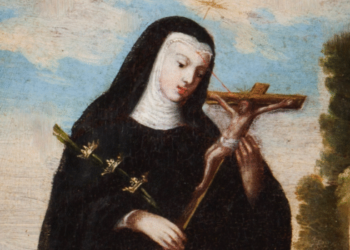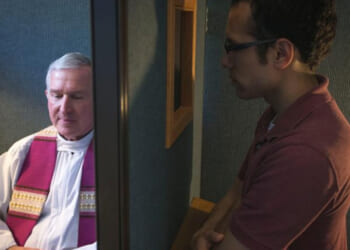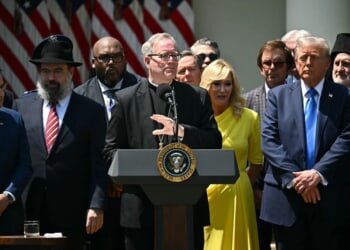One spring, the Northeast region of the United States was offered a glimpse of a solar light display rarely seen in this area. The Aurora Borealis was able to be viewed as far south as Washington, D.C. It was a scientific wonder and an astronomical marvel. But perhaps it was even more than that; perhaps, for us, it was a sign.
Unfortunately, I personally did not witness this “sign,” despite getting myself out of bed at 2 AM in search of it. Cloud cover in Western New York is something that is beyond human control, and so I rather anticlimactically crawled back into bed to catch a bit more sleep before dawn.
Not actually viewing the Aurora Borealis did not stop me from contemplating it, though. It was a highly unusual event, after all. What was God saying to us in it? Modern scientists—and most other people for that matter—would say that the Lord was saying absolutely nothing. That it was merely fantastic weather phenomena taking place. But my brain just does not work that way. To me, the Lord is always speaking. It is we who simply are not listening.
Nearly a century ago, a very similar event occurred. Strange lights lit up the night sky in parts of the world where lights like that had never before been seen by the people of that generation. Of course, one hundred years ago, our world did not have the benefit of NASA, the Hubble Space Telescope, or any other modern scientific technological advancement to predict things like the timing of solar wind particles hitting the atmosphere in unusual parts of the world. So, when the people of Scotland, Austria, Sicily, and Portugal witnessed the celestial event, they were terrified—some even panicked. Perhaps with good reason: it wasn’t long before those lights were associated with Our Lady of Fatima’s famous prediction of 1917:
When you see a night illuminated by an unknown light, know that it is the great sign that God gives you that He is going to punish the world for its crimes by means of war, famine and persecution of the Church and the Holy Father.
Less than one month later, Hitler invaded Austria, and in September, Poland.
Now I certainly am not implying that this recent Aurora Borealis that many people witnessed was the precursor to World War III (after all, we don’t need a fantastic light display to understand the threat of that possibility). But still, it seems the Lord is saying something. What could that something be?
In the Book of Acts, we hear that “certain members of the so-called Synagogue of Freedmen . . . came forward and debated with Stephen, but they could not withstand the wisdom and the Spirit with which he spoke” (Acts 6:9-10). What a strange way to put it, no? It’s not that the people could not understand Stephen; rather, they could not withstand him. In other words, their arguments against him were not powerful enough to oppose his own; they did not have sufficient proof that what he was saying about Jesus and His resurrection was untrue.
They were no match for Stephen because his words of wisdom were not his, but rather, those of the Spirit. But here’s the thing. The Freedmen went into their debate with Stephen totally closed off to the possibility that what he was speaking could be true. So they simply did not accept Stephen’s message. What does this tell us? It tells us that while we are indeed responsible for charitably speaking words of truth, we are not responsible for the outcome of our words.
Does this mean that loving others may or may not convert their hearts, but we might as well give it a shot, “just in case”? Not exactly. Let’s remember that Jesus is interested—deeply interested—in the salvation of all his children. So if we are praying for the conversion of a loved one, we can trust that our prayer is in accordance with God’s will. It’s just that we are not in a position to judge what an individual’s path to salvation will look like.
Thus, just because that path may appear to be going from bad to worse, does not mean that things are as they seem. It is true, those members of the Freedmen Synagogue did not withstand Stephen, and they did not take his words of unsurpassed wisdom as their cue to convert. In fact, they took his words as their cue to trump up false charges against him! And those false accusations, sadly, led to Stephen’s execution.
Jesus never “came to the rescue” at the eleventh hour to justify Stephen and prove them all wrong. But you know what? Jesus came at the twelfth hour. What does that mean? It means that God is outside of time, and what does not get accomplished on this side of eternity, gets accomplished on the other side. God’s “word shall not return to [Him] void, but shall do [His] will, achieving the end for which [He] sent it” (Is. 55:11). It was Stephen’s final speech before his martyrdom that decisively defined the difference between Christianity and Judaism, thus giving form to this new wineskin under Christ. It was the inability to “withstand” Stephen’s wisdom that led to the definite formation of a Church that would now come to be known as “Christian.”
Let’s also remember that from Stephen’s perspective, his stoning was no tragedy at all. To die for Christ was, for Stephen, an honor. This is what Stephen wanted, so deep was his faith in the eternal home that awaited him. But what about the men who stoned him, the ones whom he failed to convert? Let’s look at the very last words uttered from Stephen’s lips before expiring, even after he asked the Lord to receive his spirit:
Lord, do not hold this sin against them. (Acts 7:60)
Scripture does not tell us whatever happened to those members of the Freedmen Synagogue. But we cannot assume that they died in their sins. After all, for God not to answer His own inspired prayer through Stephen’s lips would make no logical sense. In fact, we can confidently hope that these men found their way to the truth at some point before they drew their dying breaths! And although we do not know exactly how that might have come to pass for each one of them, we do know precisely how it came to pass for at least one of them . . .
A man, once called Saul, who had stood by and watched Stephen’s execution with indifference—and even approval—became the greatest Christian convert in biblical history. And thanks to Paul, despite the few who were not converted on the precise day of Stephen’s stoning, millions more were converted in the two thousand years thereafter.
May we seek to understand the mysterious “signs” God sends by viewing all things in the context of eternity.
Author’s Note: Excerpt from The Safe Haven: Scriptural Reflections for the Heart and Home (Season of Easter). To purchase, visit Amazon or The Catholic Company, where all other volumes currently in print are also available.
Photo by Jonatan Pie on Unsplash















